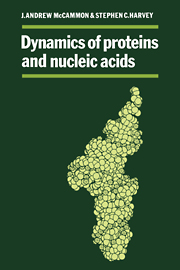Book contents
- Frontmatter
- Contents
- Preface
- 1 Introduction
- 2 Structure of proteins, nucleic acids, and their solvent surroundings
- 3 Dynamics of proteins, nucleic acids, and their solvent surroundings
- 4 Theoretical methods
- 5 Short time dynamics
- 6 Local structural transitions
- 7 Global structural changes
- 8 Dynamics of molecular associations
- 9 Recent developments and future directions
- Appendix 1 Numerical integration of the equations of motion
- Appendix 2 Detailed description of computer programs and procedures for energy minimization and molecular dynamics
- Appendix 3 Molecular dynamics at constant temperature and pressure
- References
- Index
Preface
Published online by Cambridge University Press: 05 June 2012
- Frontmatter
- Contents
- Preface
- 1 Introduction
- 2 Structure of proteins, nucleic acids, and their solvent surroundings
- 3 Dynamics of proteins, nucleic acids, and their solvent surroundings
- 4 Theoretical methods
- 5 Short time dynamics
- 6 Local structural transitions
- 7 Global structural changes
- 8 Dynamics of molecular associations
- 9 Recent developments and future directions
- Appendix 1 Numerical integration of the equations of motion
- Appendix 2 Detailed description of computer programs and procedures for energy minimization and molecular dynamics
- Appendix 3 Molecular dynamics at constant temperature and pressure
- References
- Index
Summary
At macroscopic levels, the dynamic character of life is dramatically self-evident. Motion is no less important at the molecular level of biology. Indeed, the marked biochemical effects of temperature changes imply that the activity of biological molecules reflects their thermal mobility. An appreciation of molecular flexibility and dynamics is essential to the understanding of the activity of naturally occurring molecules and to the design of new molecules with specified activities.
Detailed studies of the atomic motion of proteins and nucleic acids are of recent origin. Nevertheless, far more has already been done than can be adequately described in a single volume. The aim of this book is accordingly modest. We attempt to provide the reader with a self-contained introduction to the theoretical aspects of protein and nucleic acid dynamics. The level of presentation is intended to be appropriate for graduate students as well as for research workers in biophysics, physical biochemistry, and molecular biotechnology. Our principal goals are (1) to outline the theoretical methods and their capabilities, (2) to provide a sense of the nature and biological significance of biomolecular dynamics by reference to representative theoretical studies, and (3) to indicate some prospects and directions for future work. Experimental work is covered incidentally in connection with theoretical results.
The book is organized generally to progress from fundamentals to applications and from short time scales to the longer time scales characteristic of most biological activity.
- Type
- Chapter
- Information
- Dynamics of Proteins and Nucleic Acids , pp. xi - xiiPublisher: Cambridge University PressPrint publication year: 1987

